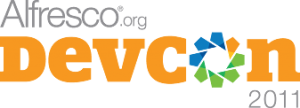Alfresco 4 Community was released last week. There’s a nice presentation on slideshare that summarizes what’s new in Alfresco 4, so I’m not going to give a comprehensive list here. And we’re going to be covering the technical details on all of the new features at DevCon in San Diego and London so I’ll save the code snippets for DevCon.
Next week, people all over the world will be celebrating the Alfresco 4 release with informal meetups so I thought in this post I’d prime the pump a bit with a brief list of the more buzz-worthy features and record some short screencasts of those so that if you aren’t able to join one of the worldwide release parties, you can have your own little soiree at your home or office. Just try not to let it get out of control. If the cops do show up, you might mention that the New York Police Department uses Alfresco.
Drag-and-Drop
I’ve been showing Alfresco 4 at JavaOne all week and drag-and-drop was pretty popular. You can drag one or more files from your machine into the repo. And you can move them from one folder to another by dropping onto the folder hierarchy. You’ll need an HTML5-enabled browser for this to work. Here it is in action (this one didn’t get created in HD for some reason):
Document Library In-Line Edit
It’s a little thing, but it’s handy. You can change file names and add tags from the document list without launching the edit metadata panel.
Configurable Document Library Sort Order & Better Site Config
How many times has a customer asked you to change the document library sort order? I know, I know. Now they can do it themselves. Also, you can now brand sites individually, so each site can have its own theme. And components can be renamed to things like your document library don’t have to be called “Document Library”.
Better Administration
The Share Administration panel now has a Node Browser, a Category Manager, and a Tag Manager. The Node Browser and the Category Manager were actually direct community contributions. Tell me again why you are still using the old Alfresco Explorer client?
DM to File System Publish
Last year at DevCon in New York, a bunch of us tackled Brian Remmington, wrestled him to the ground, and refused to let him up until he agreed to add this to the product. Once security was able to break up the scrum we apologized and had a good talk. I think deep down he appreciated our passion. I’m joking, of course, but what’s not a joke is that the DM-to-file system publish functionality is now in there. I’ll update this post with a screencast as soon as I figure out how it works.
So take a look at the presentation for a more complete summary. I didn’t show Activiti or Solr, which are two much-anticipated additions to the product, because the value they add is hard to convey in a short screencast. Feel free to record your own screencasts of your favorite new features and point me to them.

 We’ve finally got everything settled around the cities, venues, and dates for our annual
We’ve finally got everything settled around the cities, venues, and dates for our annual